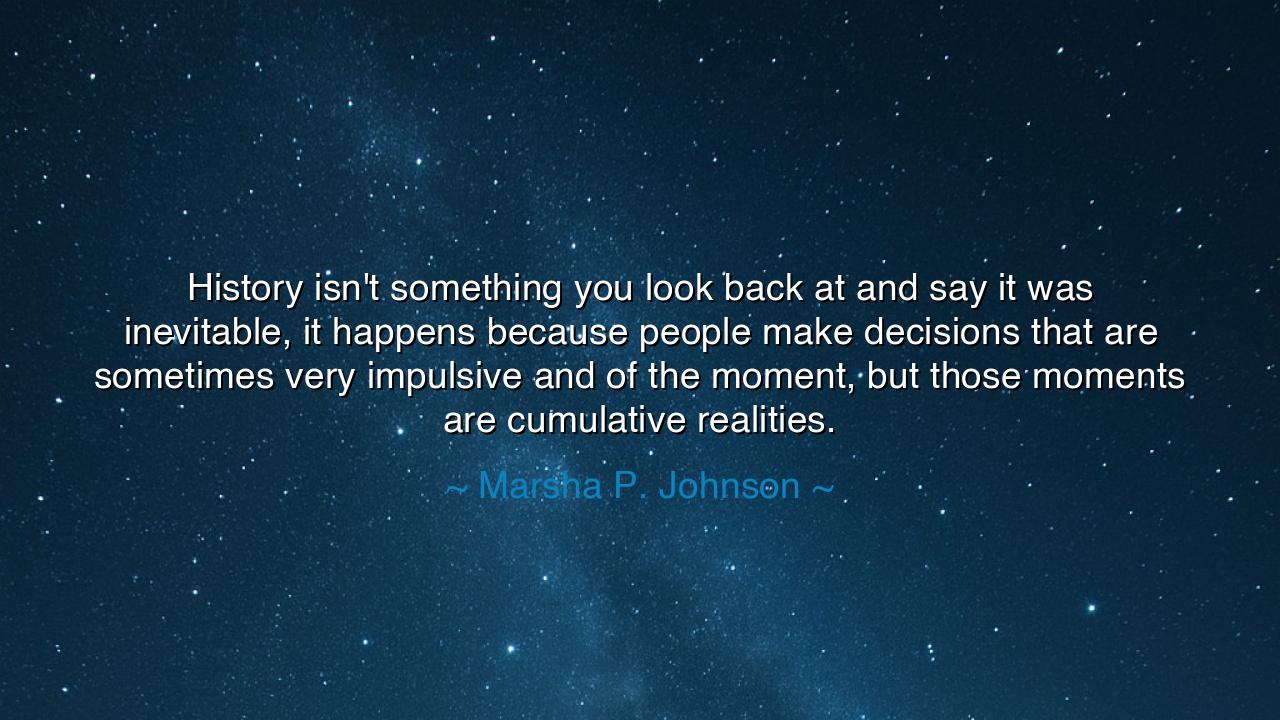
History isn't something you look back at and say it was
History isn't something you look back at and say it was inevitable, it happens because people make decisions that are sometimes very impulsive and of the moment, but those moments are cumulative realities.






“History isn’t something you look back at and say it was inevitable, it happens because people make decisions that are sometimes very impulsive and of the moment, but those moments are cumulative realities.” So spoke Marsha P. Johnson, a woman of courage and compassion, whose life burned brightly at the crossroads of struggle and change. Her words rise from the heart of the Stonewall era, a time when voices long silenced began to cry out for dignity, for life, for recognition. In this saying, she reveals a truth older than kings and deeper than empires — that history is not fate, but the living consequence of human choice. Every age is shaped not by inevitability, but by the courage and conviction of individuals who act when the moment demands it.
Johnson herself was no scholar in the halls of power, yet she understood the making of history better than many who write it. As a transgender activist and one of the first to resist during the Stonewall uprising of 1969, she saw how history is forged not by perfect plans but by sudden acts of defiance, by people who say “no” when silence is expected. She and others like her did not know, in that single night of resistance, that they would ignite a movement that would echo for generations. But this is the wisdom of her quote: history is made in moments, not monuments. What begins as a heartbeat of rebellion becomes the pulse of progress.
To say that history is not inevitable is to deny that destiny moves without human hands. It is to proclaim that every choice matters, that each decision, however small, ripples outward into the vast sea of time. Too often, people look back on the past and imagine that it could not have unfolded otherwise — that revolutions, freedoms, and awakenings were all foreordained. But this is an illusion born of hindsight. When the world trembled before change, those who stood in its heart did not see inevitability — they saw uncertainty, danger, and the need for action. They stepped forward not because they knew they would succeed, but because to do nothing would have been a betrayal of the soul.
Consider Rosa Parks, who one day in Montgomery refused to surrender her bus seat to injustice. That single act, born of exhaustion and quiet determination, became one of those “impulsive moments” of which Johnson spoke. It was not planned to change the course of nations — yet it did. It became the spark that fueled the Civil Rights Movement, proving that the smallest act of resistance, done in the fullness of conscience, can become a cumulative reality that reshapes history. Parks did not know she was making history; she was simply living truthfully in the moment — and that, indeed, is how history moves.
Marsha P. Johnson’s words are therefore a hymn to agency — to the sacred power that resides within every human being. She reminds us that history is participatory, not passive. It does not belong only to leaders or rulers, but to all who live with conviction. When we act — whether in protest, in compassion, in creativity — we contribute to the fabric of time. Each decision, each kindness, each stand taken for justice adds to the weight of what becomes “real.” The world of tomorrow is nothing more than the accumulation of the choices we make today.
Yet her words also carry a warning: to believe that history is inevitable is to fall asleep within it. Those who think the future will unfold rightly on its own will awaken too late to find it shaped by others. The “cumulative realities” Johnson speaks of are formed by those who act — whether for good or for ill. If we do not act for justice, others will act for power. If we do not speak truth, others will fill the silence with lies. Thus, the responsibility for history lies not in destiny, but in the heart and hands of humankind.
So, my children, learn this from the wisdom of Marsha P. Johnson: do not wait for history — make it. Do not dismiss your moment as too small, or your actions as too fleeting. For the river of time is built from drops, and each drop carries weight. Act with courage in the present, for the present is the womb of all futures. Speak, even when your voice trembles. Stand, even when the ground beneath you shakes. For it is through the choices of ordinary souls that the extraordinary is born.
And when you look back upon your life — as Johnson looked back upon hers — let it be said that you did not watch history unfold from afar, but that you took part in its making. For history is the sum of human hearts awakened, and every age waits for those who dare to rise and say: This moment matters.






AAdministratorAdministrator
Welcome, honored guests. Please leave a comment, we will respond soon